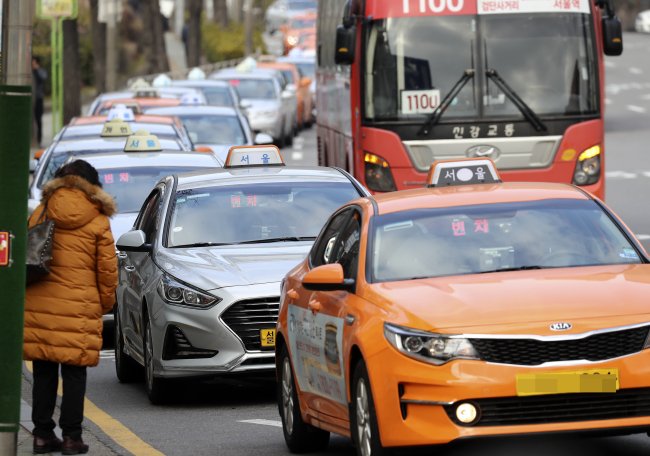[Weekender] Reinterpreting taxis in era of sharing economy
By Cho Chung-unPublished : Feb. 7, 2019 - 15:54
Taxis are more than a means of transport for Koreans. They serve as a platform where people talk about life, societal changes and, of course, politics, with those behind the wheel.
On top of their cultural and social value, for decades, they have been one of the most reliable and relatively inexpensive door-to-door transport services, offering convenience to people with hectic city lives.
These are probably the reasons why taxis and drivers appear frequently in cultural content.
On top of their cultural and social value, for decades, they have been one of the most reliable and relatively inexpensive door-to-door transport services, offering convenience to people with hectic city lives.
These are probably the reasons why taxis and drivers appear frequently in cultural content.

From movies to Korean pop music, taxis have been a common subject used to share all sorts of emotions from sorrow to happiness.
For instance, the 2017 film “A Taxi Driver” tells the dramatic story of a taxi driver who accidently drives a German reporter from Seoul to Gwangju to cover the 1980 uprising. It shows how deeply taxis are entrenched in the trajectory of Korean modern history.
Korea’s first taxis appeared in 1919 when the nation was occupied by Japan. A Japanese businessman set up the first taxi company here called Kyungsung Taxi, though riding a taxi in the early 20th century was a luxury, as it cost 6 won per hour, equivalent to a large bag of rice, according to historians.
Taxis became more popular after the 1950-53 Korean War. Local manufacturers modified military vehicles that had been left behind by the US Army for commercial use. The taxi industry rose along with the development of the Korean auto industry, catering to a limited number of people and foreigners at the time.
Today, taxis constitute a large part of the transport industry.
According to Korea National Joint Conference of Taxi Associations, there were more than 164,000 independent cabs and 88,000 company-owned taxis registered as of late last year. Nearly one-third of taxis were registered in Seoul.
However, taxis in Korea now face the biggest change in their 100 years of history. Advanced information technology and the rise of mobility services have been pushing Korea’s taxi industry to embrace change, but drivers have been reacting furiously, as they feel their jobs are being threatened.
Two taxi drivers killed themselves late last year, in protest against a planned carpooling service backed by the government’s push to nurture innovative technology services. Hundreds of taxi drivers had staged a series of sit-in protests last year, paralyzing the nation’s traffic services in the nighttime, when public transport -- buses and the subway -- is not available.
It is not the first time taxi drivers have resisted mobility services. In 2013, they opposed Uber’s arrival in Korea and called for the government to ban unlicensed drivers from offering transport services. Uber has suspended its operations but Korean tech giant Kakao has been attempting to seize the business opportunity in recent years.
Its subsidiary Kakao Mobility acquired Luxi -- one of the two carpooling services here -- and has been seeking the full operation of carpooling services. The Moon Jae-in government, which pledged full support to nurture new industries driven by the latest technologies, has been seeking to create a consultative body to resolve the standoff between Kakao and the taxi industry.
But taxi drivers have remained adamant that Kakao should first pull the plug on the carpooling service. After weeks of confrontation, Kakao said last month that it would suspend the test run of its carpooling service.
In contrast to other markets around the world, where Uber and Grab are thriving, the Korean taxi industry is seen as a unique sphere.
The biggest reason behind taxi drivers’ opposition of mobility services is the belief that they could end up jobless, which would leave the drivers, mostly in their 50s and 60s, in a difficult situation, as they have no pension to support themselves.
“I know that the advent of a sharing economy is inevitable,” said Hong Han-joo, a 63-year-old taxi driver in Seoul.
“But I hope it happens years later -- not until I save more money to make a living after I retire.”
By Cho Chung-un (christory@heraldcorp.com)








![[KH Explains] How should Korea adjust its trade defenses against Chinese EVs?](http://res.heraldm.com/phpwas/restmb_idxmake.php?idx=644&simg=/content/image/2024/04/15/20240415050562_0.jpg&u=20240415144419)











![[Today’s K-pop] Stray Kids to return soon: report](http://res.heraldm.com/phpwas/restmb_idxmake.php?idx=642&simg=/content/image/2024/04/16/20240416050713_0.jpg&u=)